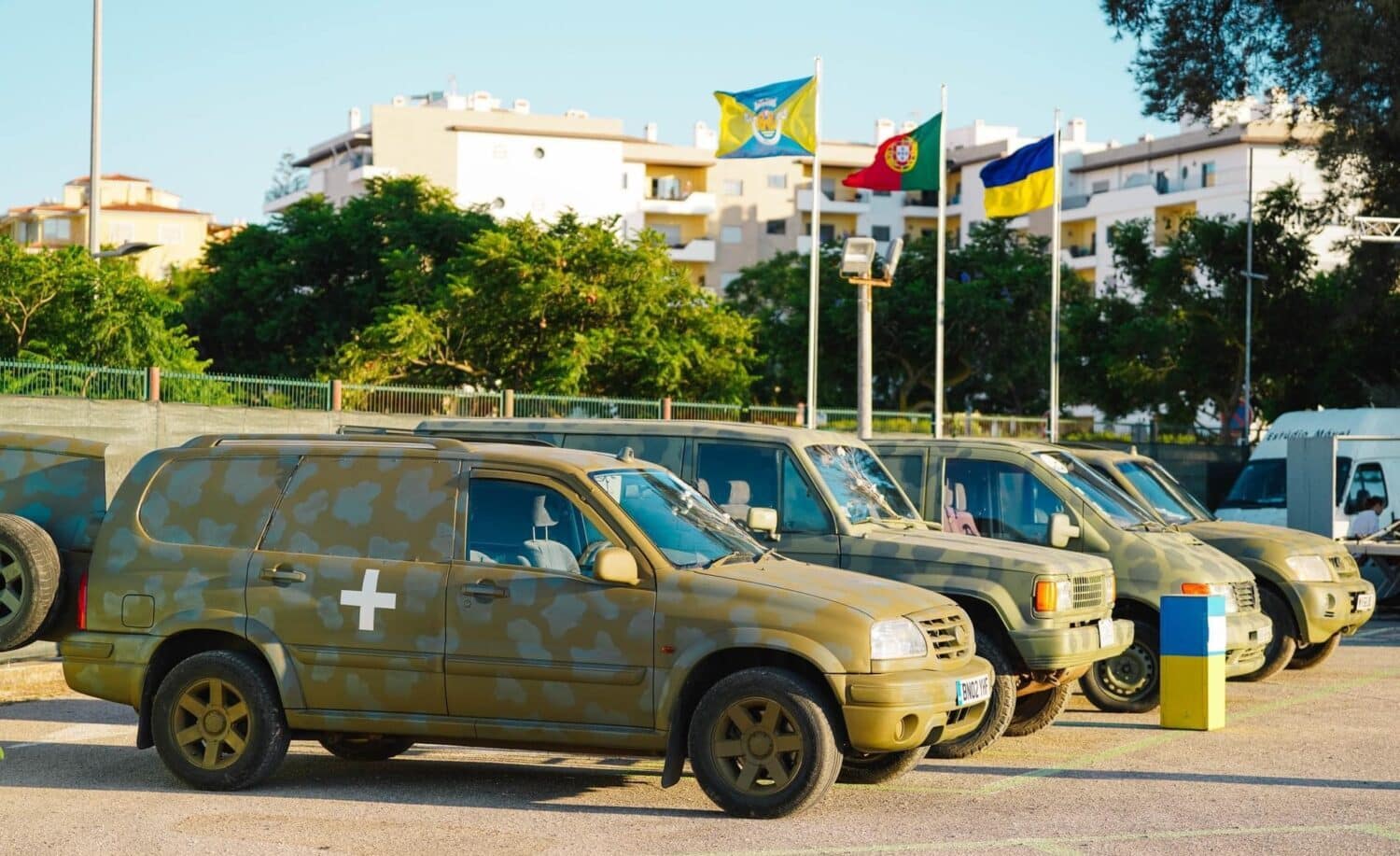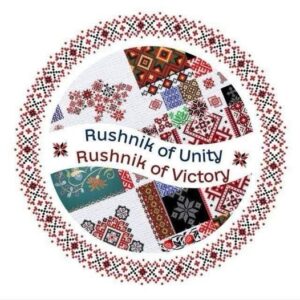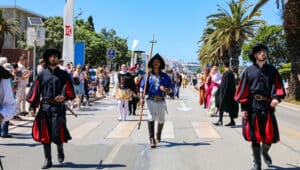How a humanitarian association in Lagos is helping to save lives in Ukraine
Set back from the ‘typical tourist sprawl’ between Praia da Luz and Burgau is another world where a small but determined group of people works late into most nights transforming 4x4s and old buses into life-saving battlewagons for victims of the war in Ukraine.
The extraordinary ‘cottage industry’ sprang up very quickly after February 2022. It is made up almost exclusively of Ukrainians belonging to the non-profit Oranta association who have lived in Portugal since the early 2000s; whose lives are here, but whose hearts beat for their home country torn apart by an illegal invasion.
In the two years and eight months since Russian tanks rolled over Ukraine’s border, the workshop of Roman Grymalyuk (Oranta’s president) has transformed 20 vehicles for medical personnel and humanitarian helpers working on the front line.
The latest two are ‘ready for transport’, along with a bus – donated from Faro municipality – which Roman is converting to take three stretchers at the back.
When we arrived, he was trying to work out a system whereby three people on stretchers could be safely loaded into the raised back of the bus without coming into contact with the back’s opening: parts of the metal structure have to be cut, but not too much, as this would compromise the strength of the vehicle.
Puzzles like these are the ‘everyday’ in this workshop, while only metres away holidaymakers ‘can’t make their minds up’ over whether to have almond milk in their lattes, or oat.
The vehicles have to be lined with metal (to deflect bullets) and fibre-glass (to help the task of cleaning blood) … These 4x4s are basically going to be ferrying the injured from battlegrounds to a central point from which they will then be transferred to another vehicle for onward transport to the nearest hospital.
The Faro bus is going to work as a dual-purpose form of ambulance: the walking wounded taking up most of the seats, and the worst injured on the makeshift stretchers at the back.
A new bus – due to come from Vila do Bispo – is going to be ‘more ambitious’: the plan is to turn it into a mobile hospital, equipped with an operating table that Roman hopes to find through health unit/hospital upgrades letting go of ‘obsolete’ equipment.

For Ukrainians – as the world has already seen – there is no such word as ‘obsolete’: everything can be ‘made the best of’. The workshop is testament to this: boxes of tins transformed into ‘candle-stoves’ line the walls, waiting for the next shipment east. Roman shows us how these ‘work’: constructed with cardboard coils, over which heated candle wax is poured, he explains they can be used to ‘warm frozen hands in the trenches’, or ‘heat up a meal for a child’.
Ukraine is facing a terrible winter: Russian missiles have destroyed most of the country’s power stations and infrastructure. Ukrainians working in little workshops like Roman’s are doing everything they can to try and create some warmth.
He shows another ingenious ‘invention’: a cotton make-up pad, dipped in wax. “It weighs nothing. Soldiers can carry them in a pocket, and when they light them, they get heat, maybe for 10 minutes.”
It’s ridiculous when you consider we are in the 21st century. But then, so much of what is happening is ridiculous. What is important is to survive.
For Roman, this is clearly his way of fighting for his country. He is delighted with the latest vehicles. One has been fitted with an infrared camera allowing it to be driven at night, without using lights (so that it is not visible to enemy drones).
We are taken on a hair-raising journey, with a Ukrainian flag fitted over the windscreen, to demonstrate how the camera, mounted on the driver’s sun visor, works. It’s a bit like being inside a video game. “Young people will be able to work it out easily,” Roman shouts over the noise of crunching gears, eyes glued to the screen as he navigates the ups and downs of scrubland between Luz and Almádena, at some speed.
“I have to make sure these things work!” he adds by way of explanation.
But how much does it cost to fit infrared cameras and mount switches to disable brake lights? “Surprisingly little! Most of it can be bought from a Chinese shop.”
The actual vehicle conversions, however, do cost money. Each 4×4 costs between €1,000 to €3,000 to fit out for onward transport – and that too can be expensive, as many need to be taken on a low-loader to the Polish border (to be handed over to army personnel) because they don’t have the right papers to go on regular roads.
With all the conversion work (and trying to keep his own business running), Roman’s concern is that ‘not enough’ is being said about Ukraine anymore. The crisis in the Middle East has pushed the invasion very much to one side, when, ultimately, the crisis in the Middle East does not pose such a threat to peace in Europe.
“I do get upset,” he says. “I wish people were more aware of what is going on…”
But perhaps most important, right now, is for increased support for Oranta, which hasn’t got the funds it needs to send the latest vehicles to Ukraine. It is putting on a Christmas Charity Dinner and Dance at the Penina Hotel on December 6 to try and raise the money needed.
Angela Broad, a long-term fund-raiser, has been involved in trying to help the association in various ways. She is donating all the proceeds from her ‘Fairy Stories’ (click here and here), which she wrote for her grandchildren during the pandemic.
As we talked about the situation in Ukraine (the chilling updates on how many North Korean soldiers are being brought in to fight on the front lines), Roman mentions a childhood friend who also moved to Portugal in the early 2000s and went back to Ukraine to fight as soon as the full scale invasion began.
Sascha (nickname Kalob) died of injuries sustained in a battle where there were no ambulances, or even vehicles, available to pick up the injured.
“Was it that started you with all this?” I ask. “No,” he answers. “It was that that means I can never stop…”
Oranta Association needs you
The Oranta Association puts on the annual Felizonda festival in Lagos that also raises funds for these initiatives.
Anyone with any desire to get involved in any way – raising funds, making candle-stoves, driving buses to Poland (this is a particular need: the driver will need a special driving licence) – would be more than welcome if they got in touch.
“It makes us feel so good when people who aren’t Ukrainians show interest,” says Roman – which, considering what is ultimately at stake, is probably the very least any of us can do.
The Oranta Association also needs very specific items of clothing: new knickers (for women) and boxers (for men); new socks; new t-shirts (preferably white). Roman explains there is no laundry service in the trenches, very little in the way of ‘bathing facilities’; soldiers need clean new underwear to replace dirty underwear.
+351 920 606 043 | oranta.pt@gmail.com | www.oranta.pt
By NATASHA DONN
























